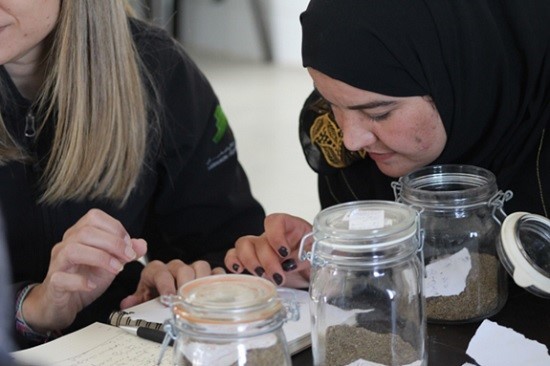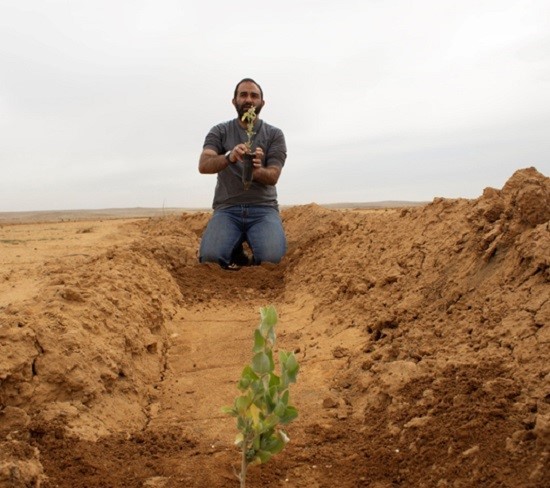SABHA,
Mafraq — Reem, a 27-year-old woman from Jordan’s Northern Badia, says
it is a point of pride for her to have extensive knowledge on the propagation
of native seedlings and the restoration of Badia land, especially in front of
her community.
اضافة اعلان
This
knowledge is one she has attained over seven years of working in WADI’s nursery
for high-quality native seedlings in Sabha, Mafraq Governorate, in the
northeast of Jordan.
“It
feels good to pass on this knowledge to other people,” she said. “Especially
because work here is completely new to the community… they are used to planting
in farms and pots, but this is different from what they’re used to,” Reem
notes.
Reem
was one of six women recruited in 2016 to work in Sabha Nursery, a project managed
by WADI for Sustainable Ecosystems Development, in partnership with the
Hashemite Fund for the Development of Jordan Badia. At the time, Reem was only
19, and looking for an opportunity to learn a trade or find a job that does not
require a high school diploma.
“The community comes first and foremost in this kind of work.”
Together
with the Hashemite Fund and local women, WADI grows seedlings at Sabha Nursery
from native seeds, using efficient unified irrigation systems that measure
exact quantities used for each seedling produced in the nursery; resulting in
the use of only one-third of the water used in conventional nurseries. These
rangeland plants are then planted in degraded lands to restore the ecosystem
and sustain community livelihoods.
“The
community comes first and foremost in this kind of work,” she said.
“We
have a lot of livestock in the Badia and a lot of grazing and desertification,
and if the shrubs are grazed before they properly develop, everything goes to
waste,” Reem explained the dilemma while examining jars of Artemisia seeds
collected from local areas that will be used to grow seedlings for the next
season.
 Reem Al-Zubeid, a Sabha Nursery employee, examines Artemisia seeds
collected from local areas, at Sabha Nursery offices, in Mafrag Governorate,
northeastern Jordan, on March 1, 2023.
Reem Al-Zubeid, a Sabha Nursery employee, examines Artemisia seeds
collected from local areas, at Sabha Nursery offices, in Mafrag Governorate,
northeastern Jordan, on March 1, 2023.
Reem
is optimistic however and says that the community are becoming more aware of
the benefits of such efforts for the sustainability of rangelands, which are vital
for sustaining the incomes of the numerous livestock breeders in the area.
This
is hardly the only obstacle Reem and her colleagues face on a daily basis as
working women in an economically and socially harsh region.
“It
was difficult for people to understand at first how women would take public
transportation to go to work, as a woman is not allowed to take transportation
on her own in the Badia,” Reem said.
However,
the community has seen a lot of development, and while they once disapproved of
Reem’s choice to work, today they understand the importance of such projects and
aspire to attain such opportunities like those offered at Sabha Nursery,
according to Reem.
And
even though the mother of five-year-old Wesam still struggles every day with
lack of transportation and childcare services, she says she enjoys her work
immensely.
“At the end of the day, it’s a women’s community here, with all that comes with it… there is time for work, but also for laughter, fights, and gossip!”
“The
atmosphere of the workplace is unique here… it keeps you busy, and your day
ends without you noticing, as you get to know new things and new faces
constantly.”
“At
the end of the day, it’s a women’s community here, with all that comes with it…
there is time for work, but also for laughter, fights, and gossip!” Reem laughs
along with her colleagues as she says this, and they reminisce about days spent
at the nursery while joyfully mocking each other.
Despite
the laughter and fun, the job is no picnic, Reem notes, as, depending on the
season, work can be physically and mentally demanding, and there is not much
time for socializing.
 Seedlings propagated at Sabha Nursery being planted in an outplanting site in Sabha, Mafraq Governorate, in January 2018.
‘Like a child’
Seedlings propagated at Sabha Nursery being planted in an outplanting site in Sabha, Mafraq Governorate, in January 2018.
‘Like a child’Reem learned
about the project of Sabha Nursery from a charitable society in the area, for
which her father worked as a tipper-truck driver.
“They
called me for a training, in which I learned about this kind of work, and a
while later they called me to join the team here in Sabha.”
Since then, they have studied the full process, and they currently
manage and carry it out every year, starting from preparing the media mix for
new seeds, and up until the seedling is fully grown and ready to be planted,
where it would have to survive on its own in a particularly dry and challenging
environment, in the hope that such seedlings would help restore these lands and
allow for other plants to grow naturally.
“[A
seedling] is like a child; when you start raising them you shower them with
affection, but once they start school, the serious work begins. … During the
tempering stage, after the stage in which you spoil the seedling, you must
prepare it for living outside, so it wouldn’t get a shock from being watered
only once a year,” Reem said.
Read more Features
Jordan News






